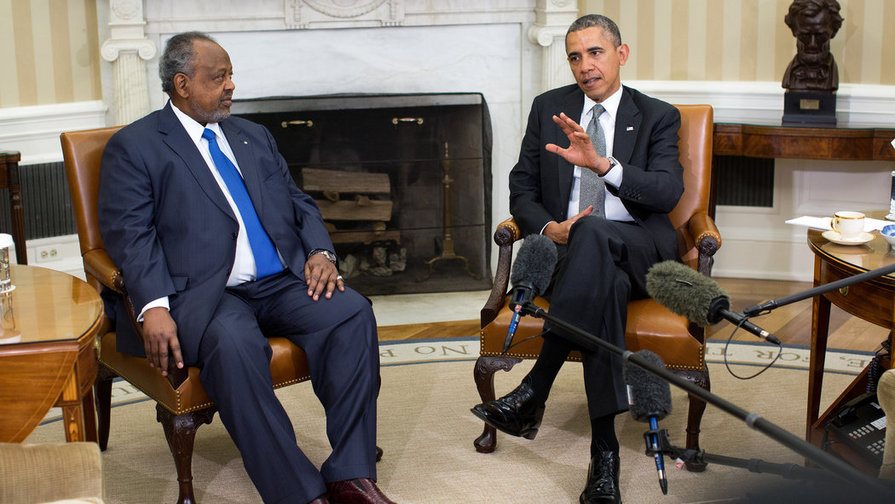China’s geo-political influence in the region a headache for Obama

AS AIR FORCE ONE took off from Nairobi Sunday afternoon, destination Addis Ababa, an earth shattering bomb went off in a Mogadishu hotel shattering the building and claiming 13 lives in what could be interpreted as a message by the militant group Al-Shabaab to U.S President Obama.
Hours earlier Obama had strongly spoken about intensifying U.S fight against Al-Shabaab by increasing support to the African Union backed force, AMISOM and by extension Somalia towards its continued offensive against terror and stabilisation of the country.
United States says it has committed $512 million to provide support to the AU Mission in Somalia (AMISOM) to build capacity to counter al-Shabaab in Somalia and provide space for political progress.
AU Address
Obama is in Ethiopia for what White House say is the first visit by a U.S president and importantly to address the 54 member African Union. The AU website says among the important issues will be skills revolution to provide the youth with employment opportunities; industrialization and infrastructural development and agro-processing.
“The U.S is wary of China’s overt check on the US presence in Djibouti given the aggressive nature by both countries in pursuing geo-political influence in Africa.’
In addition, expected to feature in both the bilateral talks and the speeches are issues around, but not limited to, education, youth and women’s empowerment, trade, investment, and peace and security, particularly the fight against terrorism and extremism.
Counter-terrorism
But there is more to Obama’s list of do’s in Ethiopia as he concludes his African tour, perhaps one of the last of rounds before his term comes to a close in 18 months time. Just like it was in Kenya, Obama is equally confronted with terrorism in the region which has snaked its way into the region and posing a threat to economies in East and the Horn of Africa.
Ethiopia is one of the key troops contributing countries to the 22,000 strong AMISOM force in Somalia which has made significant strides in decimating the militant group Al-Shabaab. But unlike Kenya, Ethiopia has not suffered Al-Shabaab attacks on a large scale.
Chinese contracts
Besides the official AU address, China’s increased influence in the region is of concern to Washington. From the imposing 99.9 meters tall $200 million Chinese funded AU headquarters to a myriad infrastructure projects in Ethiopia, Obama is ushered in to another Chinese make over just as he rode through the Thika Superhighway in Nairobi, another impressive Chinese project.
Only three days ago China pledged $700 million loan to Ethiopia adding to a plethora of other bilateral agreements between the two countries. CIA Fact Book estimates Ethiopia’s population at 99,465,819 making Ethiopia not only the most populous in the region but also a huge market for China.
Geo-political tussle
But the developments in the tiny neighbour, Djibouti has Washington jittery and vexed. Largely defined as a ‘basing rentier state’, Djibouti has been America’s strategic partner for its war on terror in the Horn of African and the Arabian Peninsula. Camp Lemonnier, which houses 4,500 American military personnel and is the only US military base in Africa, is currently undergoing a $1.4 billion (£900m) upgrade. It provides a vital base US Special Forces, fighter planes and helicopters, and well as being a major operational centre for drone operations in Yemen and Somalia. It is the only permanent US base on the continent.
Drone bases
Camp Lemonnier has been instrumental for American drones missions and have been credited for successful inroads into Al-Shabaab networks in Somalia with notable drone strikes which have killed the group’s leaders including Ahmed Abdi Godane September last year. Others include intelligence commanders Yusuf Dheeq and Tahlil Abdishakur.
Foreign Policy reported last month that a team of special operators from the Joint Special Operations Command, the elite U.S. military organization famous for killing Osama bin Laden, operate from Kismayo airport in Somalia. The command now provides intelligence and cover for AMISOM and Somali National Army troops on the ground.
Guelleh regime
Djibouti is also home to Japanese and French military bases. However the souring relations between the U.S and Djibouti for what Washington says is the erosion of human rights by President Ismail Omar Guelleh’s regime is costing the U.S more than it might have wanted to achieve by admonishing Guelleh.
Guelleh has cast his eyes eastwards and has opened doors to the Chinese. Beijing last year inked a $400 million with Djibouti to develop the country’s port facilities. China sees this an opportunity to counter American influence in the region and reports indicate Beijing could be negotiating for space to set up a military base.
Bab al-Mandeb straits
The U.S Information Energy Information Administration, EIA, says the Bab al-Mandeb straits in Djibouti is a key global maritime energy transport artery that moved 3.8 million barrels per day of crude oil in 2013, making it the world’s 4th busiest maritime energy choke-point.
In a white paper titled, China’s Military Strategy released in May, China’s State Council Information Office warns of ‘the outside threats of hegemony, power politics and “neo-interventionism”, a statement which could intimate to China’s reaction to not only the contests over the South China sea with Japan but also countering U.S expansionist tendencies in Africa.
The U.S is wary of China’s overt check on the US presence in Djibouti given the aggressive nature by both countries in pursuing geo-political influence in Africa.
As Obama spends another two days in Ethiopia, a charm offensive on Djibouti might be on the cards as the U.S seeks to reinforce its presence and influence in the region.
By Roble Billow